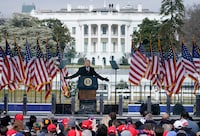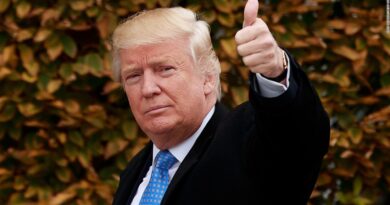Trump campaign insider recounts failed hunt for 2020 fraud in new book

The December 2020 claim of voter fraud was explosive, if true: More than 700,000 people had voted twice in Wisconsin, the tip alleged.
But when a highly paid expert for Donald Trump’s campaign began to study the claim at the behest of a Trump lawyer, he quickly realized that not only was it false, but it had also traveled a surprisingly twisted path before landing in his inbox.
The expert, Ken Block, learned it had first appeared in a post on a website called TheDonald.win, where it was spotted by the owner of an IT company, who brought it to the attention of the general manager of Trump’s golf course in the Bronx.
The golf executive forwarded the tip to the president’s son Eric, who passed it along to the lawyer. At last, the lawyer, Alex Cannon, directed the wild Wisconsin claim to Block, a software engineer and former politician from Rhode Island who was hired by the campaign shortly after the 2020 election.
“I think there is a fundamental flaw with the analysis,” Block told Cannon a few hours later, in a Dec. 4, 2020, email reviewed by The Washington Post. The hundreds of thousands of supposedly double-counted votes were “nothing of the sort.”
“They have incomplete data, did not recognize that, and inferred that the only logical explanation is fraud rather than incomplete data,” he wrote in the email.
Block describes the moment in a new book, “Disproven,” which will be released Tuesday. In the book, Block reveals how, again and again in the months after the November 2020 election, he was tasked by Trump’s campaign with batting down implausible and inaccurate allegations that Joe Biden had won the election through fraud.
Block’s book provides an insider’s account of the desperate measures Trump’s campaign took to pursue allegations of voter fraud and of how quickly the campaign concluded internally that each one was invalid, even as the president continued to rile up his supporters by claiming the election was stolen.
Cannon declined to comment. A Trump spokesman did not respond to a request for comment.
In the book, Block describes how the number of claims sent his way “snowballed” in the weeks after the election. He was often asked to verify or disprove the allegations in a day or less.
“At first, the requests were worded ‘Please try to verify this claim,’” he writes. “By the end, the requests were phrased ‘Tell me why this claim is wrong.’”
In a recent interview, Block said he studied more than a dozen complaints from the Trump campaign — and none of them were substantiated. Some could be dismissed within minutes, while others took considerable research, he said. Ultimately, he was paid about $800,000 for his work, which was not made public at the time because it did not help Trump, he said.
An invoice reviewed by The Post showed his work was extensive. It included analyzing more than 21 million voter records, reviewing voter data from five swing states, examining voting patterns at Pennsylvania nursing homes and comparing voter registrations to the Social Security death index, looking for possible instances of votes cast in the names of dead people.
Yet more work was conducted by another expert firm that was paid more than $1 million. When its work also did not prove fraud, it also was not made public, The Post reported.
In the book, Block describes how he was contacted by Cannon days after the 2020 election based on his ownership of a company called Simpatico Software Systems and his previous work exploring voting issues, including on a Trump White House commission set up in 2017 to examine potential fraud in federal elections.
Block recounts that he demanded to be paid upfront for his work because Trump famously did not pay contractors. The campaign agreed, he writes. Block said he never spoke directly to Trump about his work, though he was told campaign officials briefed Trump on some of his findings.
Block’s book explains how he found himself in the center of repeated and furtive efforts to overturn the election, a haphazard effort that often enlisted seemingly random people to find fraud before Biden took office.
At one point, emails show, the Trump team sent Block a list of people who had died in Pennsylvania that was drafted by a funeral home owner, who said he “compiled this list from online obituaries from the local funeral homes.” But Block writes that when he examined the data, he did not find evidence of fraud.
Another time, Block writes, he was given a sworn affidavit from a mathematics professor at Williams College in Massachusetts that allegedly demonstrated fraud, but on examining the claims, he found them faulty. Again, he informed the campaign.
Emails reviewed by The Post show he was given 11 pages of a report compiled by aides working for the Trump campaign called the “Voter Integrity Project,” once again designed to show fraud. All of it was underwhelming or misleading, he said.
“If the question is: is this stuff a game changer,” he wrote in an email at the time to Cannon, “it is not.”
At another point, Block writes, he was given information about votes cast in the names of dead people in Nevada just before Trump’s lawyers included the data in a motion filed in court. Proper vetting had not been done on the claims, he writes.
“My communication back to the campaign with my findings was: ‘DO NOT ALLOW THIS [analysis] TO GO OUT,’” he writes. The lawsuit was not filed, he writes.
Despite his efforts to push back on dubious claims, Block said, he would often see other allegations pop up in lawsuits, television interviews or news conferences by Trump that he had not checked and believed could be easily disproved.
“There was one memorable meeting where I proved wrong one of the claims attached to the Pennsylvania lawsuits. There were 30 people on a conference call who had a vested interest in seeing this go ahead,” he said. “They just ended the call.”
Block said he was surprised by how many campaign staffers were also skeptical of Trump’s claims, including the lawyer Cannon, who appeared to be under “a tremendous amount of pressure.”
He groups Cannon with other campaign lawyers who were trying to perform “due diligence” on the claims — while another group of lawyers, led by former New York mayor Rudy Giuliani, did not appear concerned about whether the fraud assertions were true. “They just wanted to impugn the election results by filing lawsuits they must have known were false,” he said.
A spokesman for Giuliani did not respond to a request for comment.
Since the election, Block writes, he has received subpoenas as part of investigations by special counsel Jack Smith and Fulton County, Ga., District Attorney Fani T. Willis, who are both pursuing criminal cases against Trump, alleging that the former president improperly tried to overturn the election. At issue in both of those cases will be whether Trump understood that the allegations he was making about voter fraud were false. Block said he has provided documents and met with investigators but did not know whether he would be asked to testify in any trials.
Block writes in the book that it has disturbed him to see so many Republicans embrace Trump’s false claims, including in his home state of Rhode Island. And he says he fears that even more claims will come this year from Trump and those who follow him.
“It’s important to understand why the claims of fraud that were made were not just wrong but were demonstrably wrong. We have a narrative that’s false that the election was stolen,” he said in an interview. “The election wasn’t stolen, and you can prove it.”


